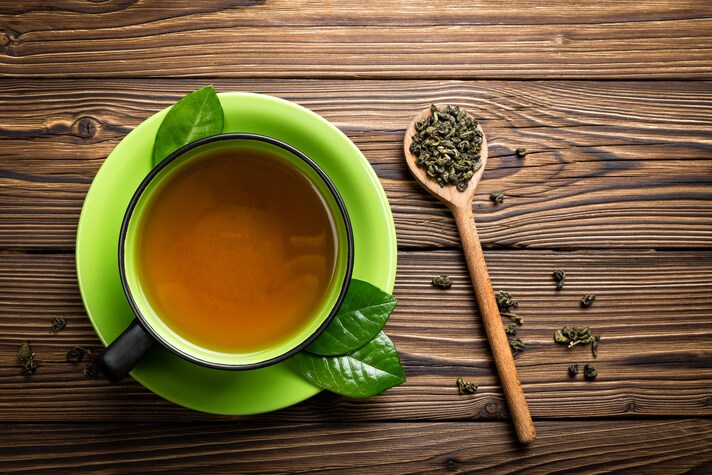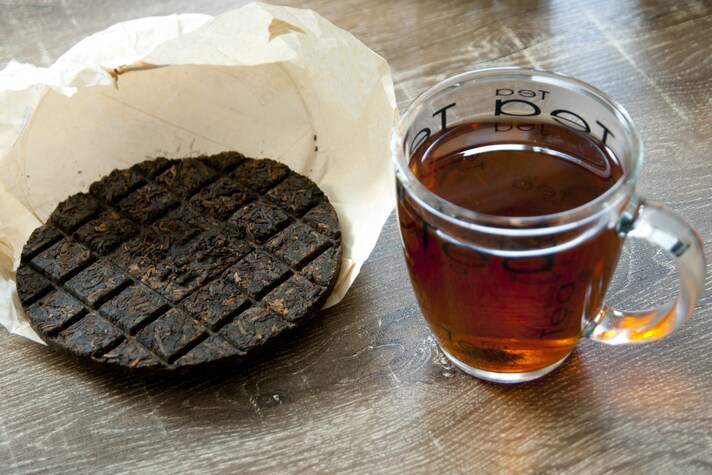
Green tea is a well-known and popular type of tea, but research has found other herbs, roots and flowers with anti-obesity properties that can be made into herbal infusions.
If you are getting a bit tired of the taste of green tea, why not change up to some of the other varieties that aid weight control?
1. Green Tea

Green tea tops the list, and it contains a large amount of catechins (including epigallocatechin gallate – EGCG) and less caffeine than coffee.
Although green tea has less caffeine than coffee, it contains lots of EGCG which helps to reduce inflammation, and inflammation-induced obesity.
Some studies have shown that green tea could be helpful for obese and diabetic patients, as it could increase fat metabolism and suppress obesity genes.
To make a cup of green tea:
Heat a cup or two of water, but don’t let it boil. Pour the water into a teapot and add a teaspoon or two of green tea leaves. Cover and leave to steep for 4-5 minutes Squeeze a bit of lemon juice in if you like, and enjoy.
Green tea should be drunk with breakfast, and between meals. Because it contains caffeine, don’t drink it before bed, and don’t have more than five cups per day.
2. Hibiscus Tea

Hibiscus tea is a potent antioxidant, and is caffeine free.
Research has found that drinking this tea can help lower blood pressure. High blood pressure causes stress, which can increase toxins in the body and can lead to inflammation.
When your body is constantly inflamed, it stops fat being metabolized, and this can lead to weight gain.
To make hibiscus tea:
Bring a cup of water to the boil Add a teaspoon of hibiscus tea/flowers to a teapot When the water is boiling, pour into the teapot Steep for 5 minutes before straining it and drinking
Drink hibiscus tea at breakfast and between meals. If you find it difficult to fall asleep, drink some mild hibiscus tea before bed. Don’t drink more than three cups per day.
3. Chamomile Tea

This tea is anti-inflammatory, antidepressant, anti-anxiety and sleep inducing, all of which have a direct relation to weight control.
Chamomile tea also contains phenolic compounds like quercetin, luteolin, apigenin, patuletin, and scientists think these are responsible for its anti-obesity properties.
To make chamomile tea:
Boil a cup of water Pour it into a teapot containing a chamomile tea bag or two teaspoons of chamomile flowers. Cover and steep for 5 minutes Strain into a cup and enjoy
Drink this tea before you go to bed in order to sleep better. If you feel down or anxious during the day, have a milder version of chamomile tea. Don’t drink more than two cups of chamomile tea per day.
4. Ginger Tea

Ginger is commonly used as a spice and an ingredient in food. Ginger contains a bioactive compound called gingerol, which gives it its strong, characteristic smell, as well being anti-inflammatory, antioxidant, anti-nausea and glucose-sensitizing.
Ginger also helps to increase satiety levels and enhance thermogenesis.
To make ginger tea:
Heat a cup of water in a pan Add a teaspoon of grated ginger to it Boil it on a stovetop for 5 minutes Add honey and lemon if you want
Drink ginger tea with breakfast or between meals, and limit your intake to three cups.
5. Peppermint Tea

Peppermint tea has a soothing and calming effect, and is especially good for digestion and stomach upsets.
Peppermint contains volatile compounds such as menthol, menthone, hesperidin, luteolin and eriocitrin, which have mood-raising, anti-inflammatory, antimicrobial and antioxidant effects.
To make peppermint tea:
Bring a cup of water to a boil in a pan Add 5-10 peppermint leaves to the boiling water Boil for 5-7 minutes Strain and drink You can also use peppermint tea bags, and steep in hot water for around 3 minutes
Drink this tea between meals, with breakfast or within 2 hours of going to bed. Limit it to two or three cups of peppermint tea per day.
6. Calendula Tea

Research has found that calendula has strong anti-inflammatory properties, and has a flowery refreshing taste that can help reduce stress and inflammation-induced weight gain.
To make calendula tea:
Boil a cup of water Add one or two teaspoons of dried calendula flowers, cover, and steep for 10 minutes. Strain it into a cup before drinking
Drink calendula tea with breakfast or between meals, and don’t drink more than three to four cups a day.
7. Rosemary Tea

Rosemary is an herb often used in cooking, and research on the leaves and extract found that rosemary has strong antioxidant properties, and also is an antidepressant.
To make rosemary tea:
Boil a cup of water Add it to a teapot along with a sprig of fresh rosemary or two teaspoons of dried rosemary. Steep it for 5 minutes, but no more than 10 minutes, or it can get bitter. Strain into a cup and drink
Have rosemary tea at any time during the day, but don’t drink more than three cups per day.
8. Matcha Tea

Matcha tea doesn’t get much processing, and you drink the leaves in powdered form. It contains a lot of epigallocatechin gallate, a strong antioxidant that flushes toxins and helps boost immunity.
To make matcha tea:
Sift a teaspoon of matcha powder Add it to a cup of hot water Swish it around vigorously until it becomes frothy.
Drink matcha tea whenever you want to relax, but don’t consume more than two teaspoons of matcha per day.
9. Pomegranate Tea

Pomegranate tea is made with pomegranate juice, ground pomegranate seeds or dried pomegranate flowers.
This tea is naturally sweet, so if you miss sugar in your beverages, this could be a good weight loss tea for you.
To make pomegranate tea:
Bring a cup of water to a boil and take off the heat as soon as it does. Add a teaspoon of chamomile or green tea and crushed pomegranate seeds or dried pomegranate flowers to a teapot. Pour the hot water over the blend, and steep for 4-5 minutes. Strain into a cup and drink.
Drink for breakfast of in between meals, but limit your consumption to three cups per day.
10. Oolong Tea

Oolong tea comes from the same plant as green and matcha teas, but the processing is different. It is also full of antioxidant EGCG, and scientists have found that oolong tea is useful for weight loss, as it helps to lower the blood lipid levels and increases fat metabolism.
To make oolong tea:
Bring a cup of water to the boil Remove from heat and let cool down for around 2 minutes Add a teaspoon of oolong tea to a teapot and pour the water in Cover and steep for 3-4 minutes Strain and drink
Drink at anytime except near bedtime, as it contains a small amount of caffeine. Try to consume no more than five cups of this tea a day.
11. White Tea

White tea also comes from the same plant as green, matcha and oolong tea, and is found to inhibit fat cell formation, as well as help in fat breakdown.
Research also shows that white tea can lead to inhibition of diabetes-related effects in the brain.
To make white tea:
Heat a cup of water, but don’t let it boil Remove from heat and let cool down for around 2 minutes Add a teaspoon of white tea to a teapot and pour the water into it. Cover and steep for 3-4 minutes Strain and drink
Drink at anytime except before bed, and limit consumption to two cups per day.
12. Pu Erh Tea

This tea is named after Pu’er, a town in the Yunnan province in China. This tea also comes from the tea tree that gives green, white, matcha and oolong tea! This tea is fermented and is also known as black tea.
Research shows that pu erh tea helps to lower lipids, and also helps to reduce weight in patients with metabolic syndrome.
To make pu erh tea:
Heat a cup of water, but don’t let it boil. Remove from heat Add around half and inch of pu erh tea to a teapot Pour the water into the teapot Cover and steep for 3-4 minutes Strain and drink
You can drink this tea with breakfast or between meals, and you shouldn’t drink more than two or three cups of it per day.
;Resize,width=767;)
